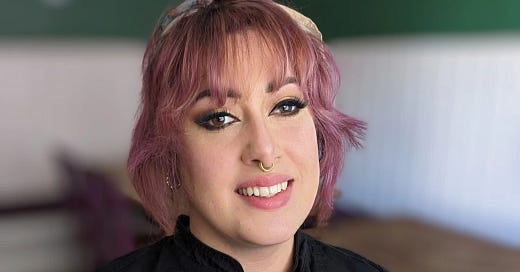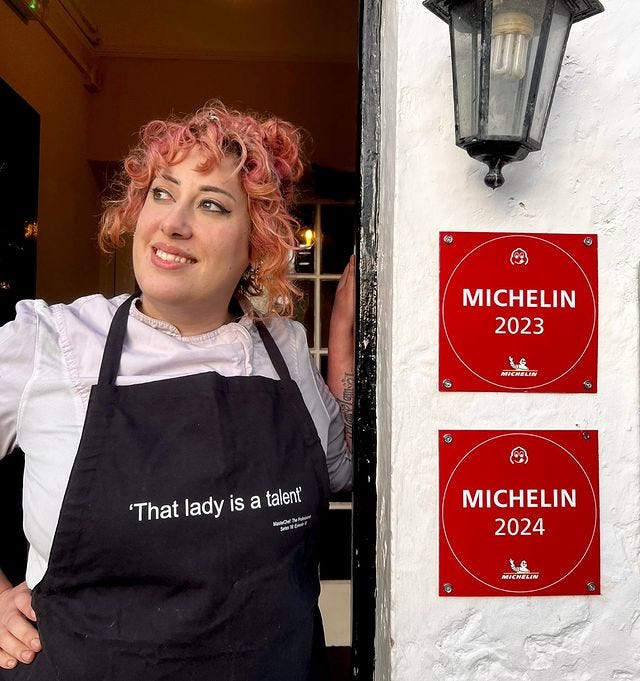Ayesha Kalaji: “I think I can learn more, but I don’t think I can become more”
The chef on reframing Arab identity, knowing her limits and holding space for each other
Hi, welcome back to Mixed Messages! This week I’m speaking to chef Ayesha Kalaji, who is of mixed Jordanian and white British heritage. Leopard-print clad Ayesha is owner and chef at Glastonbury’s Queen of Cups, a Michelin Bib Gourmand-awarded restaurant that serves modern Middle Eastern cuisine. Ayesha’s food reconciles her dual identities, mixing flavours and inspirations to ensure no guest ever leaves hungry. After spying her on MasterChef: The Professionals, I was excited to learn more about her influences. Read Ayesha’s story below.
How do you define your racial identity?
I've always struggled to define my identity. My dad is one of eight siblings, most of whom were born in Syria. My dad and his younger brother were born in Jordan. Some of the family identify as Syrian while my dad and his brother identify as Jordanian, so there’s immediate confusion. My grandparents were born before there were borders, so it's almost an enforced identity.
My dad and his brothers studied at university in the UK, he met my mum at the University of Southampton. She’s mostly English from the East End of London with a little bit of Italian, so I’ve always had an affinity for London too. My mum has her little cockney moments, which I adore.
I used to say I’m half-Arab, but I’d visit my family in Jordan and felt more ingrained in that, so as I’ve gotten older I’ve started saying ‘British-Jordanian.’
I’m a child of immigration – my dad couldn’t come back after mandatory military service unless he and my mum got married, so they did. After I was born, we moved to North Wales. I was probably the only half-Arab in my village. I was considered exotic, even though I burn in the sun.
What was it like growing up in a white environment?
My dad has always ingrained pride in me, but never truly brought me up with the culture. So for all intents and purposes, my upbringing was very British. We’d have labneh, pittas and tomatoes for breakfast on the weekends and we’d visit Jordan in the summer, but I was never surrounded by my Arab culture.
Was that something you wanted to reconnect with later in life?
Yes. I did my degree in Middle Eastern Studies, including language, politics, history and culture. That was partly because I thought I was going to be a war correspondent, but also because I wanted to explore my identity. I felt a level of shame that I didn't speak the language; I couldn’t read the books, I couldn’t sing the songs. I knew about some of the food, but I felt remiss in not knowing more.
Through food, I was able to find a connection. I still don't feel like I'm fully connected to my Jordanian heritage. I haven’t lived there, I’ve only been for a few weeks at a time. I feel more of a connection to my Arabness. But it has been really important to me to strengthen those ties and bonds.
My family has an old culture with a rich history and I want to be able to pass that on and for my family to have a legacy. It’s really important to me. In this time and climate, it’s not exactly cool to be Arab. I want to be able to be proud of it, be open about it and fight a lot of stigma. There’s this idea of the meek quiet Arab woman, but I’m not like that at all.
You said you don’t feel Jordanian enough – what do you think would make you feel that way?
I don't know if there’s a simple answer to that. I’m a product of my upbringing and a combination of experiences and events. I don’t think I will ever be accepted as a full Jordanian because I'm not. I feel like if I spoke the language, if I was able to communicate freely, it would be one thing. But I’ve had a different cultural upbringing to my cousins.
I can definitely say I'm half-Jordanian and I'm trying to learn more about my Jordanian heritage. I feel like an outsider or stranger, I’ll always be slightly separated by this other element of being half-English. I think I can learn more but I don’t think I can become more.
A lot of being mixed-race is a struggle to accept who you are when you don't know who you are for so long. I’ve finally accepted who I am, but it's also knowing that I have my limits.
How does your mixed heritage influence the food you cook?
I would never call my food authentic, it’s my spin on traditional recipes. Reading about the food brought me closer to my heritage, so I would say my food is an homage. It’s Middle Eastern food seen through my personal lens. It’s modern, from a different generation, that mixed-race generation. It’s entirely my identity in my cooking. My falafel has Welsh seaweed in it because I grew up in Wales, and that is part of what defines me. My food is a real representation of who I am as a person.
Do you think it influenced more than your cooking, perhaps your approach to life?
Absolutely. With the juxtaposition of two cultures, you’re forced to view two separate ideas and identities at once. I can be Arab and English at the same time. There are differences in those cultures for sure but I don't want to feed into the idea of ‘clashing’ cultures.
You have to be open to different ideas and thoughts because you’re not settled in one specific outlook, you’ve adopted multiple identities within yourself. It makes you more open because you’re forced to be, you are not one thing and my experience is the world will not treat me as such.
I'm part of two cultures and two societies that I have learned to adapt to. Neither society necessarily will accept us fully, so we have to find ways to merge with them. It does lead to a more tumultuous upbringing, because you will never feel fully satisfied. If I go to Jordan, they look at me and think ‘this woman is not Arab.’ Whereas in the UK, I have this foreign-sounding name and I don’t look 100% English. There's always that slight societal resistance.
Have you noticed any stereotypes around mixedness?
In my family, I’ve been really fortunate to see mixed-race marriages and couples at their best. I do know there is this idea that these two identities can’t merge, but I’m learning that there is no there no need for a barrier. We just have to compromise and hold space for each other.
In the world we’re living in, mixed-race marriages, partnerships and even businesses are so much more feasible and acceptable. I think we need to change the focus from older generations, where it was much more divisive, to the younger generation mixing and mingling and sharing ideas. I’m optimistic – we are very well equipped to be voices in a future where there needs to be a voice without the shouting, to say that we may not be from one culture or another, but we represent two communities and have that understanding.
What’s the best thing about being mixed for you?
I love the fact that I have two cultures I can learn about and explore, and that I can talk to people because I have been forced to adapt and accept that I am two identities merged. I'm like a chameleon. I have a much more open mind because I've had to grow up with two identities that don't necessarily always correlate in terms of their ideals.
Can you sum up your mixed experience in one word?
Enlightening. I’ve learned a lot about people and myself.
Next week, I’ll be speaking to One Love and King Richard director Reinaldo Marcus Green. Subscribe to get Mixed Messages in your inbox on Monday.
Enjoy Mixed Messages? Support me on Ko-Fi! Your donations, which can start from £3, help me pay for the transcription software needed to keep this newsletter weekly, as well as special treats for subscribers. I also earn a small amount of commission (at no extra cost to you) on any purchases made through my Bookshop.org and Amazon affiliate links, where you can shop books, music and more by mixed creators.
Mixed Messages is a weekly exploration of the mixed-race experience, from me, Isabella Silvers. My mom is Punjabi (by way of East Africa) and my dad is white British, but finding my place between these two cultures hasn’t always been easy. That’s why I started Mixed Messages, where each week I’ll speak to a prominent mixed voice to delve into what it really feels like to be mixed.








